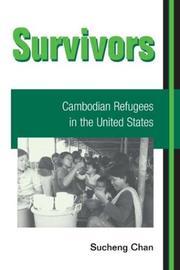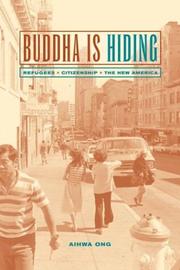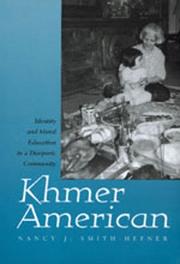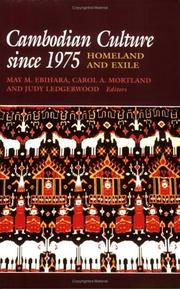| Listing 1 - 10 of 16 | << page >> |
Sort by
|
Book
ISBN: 088798228X Year: 2000 Volume: 28 Publisher: Ottawa : Société historique du Canada,
Abstract | Keywords | Export | Availability | Bookmark
 Loading...
Loading...Choose an application
- Reference Manager
- EndNote
- RefWorks (Direct export to RefWorks)
Immigrants --- Cambodians --- Laotians --- Vietnamese --- Cambodgiens --- Laotiens --- Vietnamiens --- History --- History. --- Histoire

ISBN: 0252050991 9780252050992 0252029208 0252071794 9780252029202 9780252071799 Year: 2004 Publisher: Urbana
Abstract | Keywords | Export | Availability | Bookmark
 Loading...
Loading...Choose an application
- Reference Manager
- EndNote
- RefWorks (Direct export to RefWorks)
Cambodian Americans --- Refugees --- Cambodians --- Ethnology --- Displaced persons --- Persons --- Aliens --- Deportees --- Exiles --- Social conditions. --- Cambodia --- History --- Social conditions --- United States --- Biography --- 20th century
Book
ISBN: 9788776941390 8776941396 9789971697785 9971697785 997169803X Year: 2014 Publisher: Copenhagen : Singapore : NIAS Press ; NUS Press,
Abstract | Keywords | Export | Availability | Bookmark
 Loading...
Loading...Choose an application
- Reference Manager
- EndNote
- RefWorks (Direct export to RefWorks)
Khmer (Southeast Asian people) --- Human ecology --- Cambodians --- Khmers --- Ecologie humaine --- Cambodgiens --- Vietnam --- Mekong River Delta (Vietnam and Cambodia) --- Viêt-nam --- Mékong, Delta du (Viêt-nam et Cambodge) --- Ethnic relations --- Political aspects. --- Civilization --- Relations interethniques --- Aspect politique --- Civilisation
Book
ISBN: 1442697717 9781442697713 9780802099624 0802099629 9780802099624 Year: 2009 Publisher: Toronto, [Canada] ; Buffalo, [New York] ; London, [England] : University of Toronto Press,
Abstract | Keywords | Export | Availability | Bookmark
 Loading...
Loading...Choose an application
- Reference Manager
- EndNote
- RefWorks (Direct export to RefWorks)
Janet McLellan uses ten years of ethnographic fieldwork, including extensive interviews, to highlight the difficulties Cambodians have faced in Canada.
Cambodians --- Refugees --- Ethnology --- Khmer (Southeast Asian people) --- Displaced persons --- Persons --- Aliens --- Deportees --- Exiles --- History. --- Social conditions. --- Religion. --- Cambodgiens --- Refugiés --- Canadiens d'origine cambodgienne --- History --- Social conditions --- Religion --- Histoire. --- Conditions sociales --- Histoire --- Cambodians - Ontario - History --- Cambodians - Ontario - Social conditions --- Cambodians - Ontario - Religion --- Refugees - Ontario --- Cambodgiens - Ontario - Histoire. --- Cambodgiens - Ontario - Conditions sociales --- Cambodgiens - Ontario - Religion --- Refugiés - Cambodge --- Refugiés - Ontario --- Canadiens d'origine cambodgienne - Ontario - Histoire --- Canadiens d'origine cambodgienne - Ontario - Conditions sociales --- Canadiens d'origine cambodgienne - Ontario - Entretiens --- Ontario. --- Cambodia. --- 1983 --- -Braḥrājāṇacakr Kambujā --- Cam Bot --- Cambodge --- Cambodja --- Cambogia --- Camboja --- Cambotja --- Campuchia --- Chien-pʻu-chai --- Democratic Cambodia --- Democratic Kampuchea --- Kambodscha --- Kambodža --- Kamboja --- Kambujā --- Kamphūchā --- Kampuchea --- Kampuchea démocratique --- Kâmpŭchéa Prâchéathĭpâteyy --- Kampuchii︠a︡ --- Khmer Republic --- Kingdom of Cambodia --- Preah Reach Ana Chak Kampuchea --- Preăhréachéanachâkr Kâmpŭchéa --- Rājraṭṭhabhipāl Kambujā --- République du Cambodge --- République khmère --- Roat Kampuchea --- Royal Government of Cambodia --- State of Cambodia --- Tchin-la --- Andalüe --- Andalüe Sheng --- Antarya --- Canada West --- Ontarėj --- Ontarijas --- Ontario-sh --- Ontariu --- Onṭaryo --- Onṭeryo --- Upper Canada
Book
ISBN: 1785334719 1785334700 Year: 2017 Publisher: New York ; Oxford, [England] : Berghahn Books,
Abstract | Keywords | Export | Availability | Bookmark
 Loading...
Loading...Choose an application
- Reference Manager
- EndNote
- RefWorks (Direct export to RefWorks)
"Grace after Genocide is the first comprehensive ethnography of Cambodian refugees, charting their struggle to transition from life in agrarian Cambodia to survival in post-industrial America, while maintaining their identities as Cambodians. The ethnography contrasts the lives of refugees who arrived in America after 1975, with their focus on Khmer traditions, values, and relations, with those of their children who, as descendants of the Khmer Rouge catastrophe, have struggled to become Americans in a society that defines them as different. The ethnography explores America's mid-twentieth century involvement in Southeast Asia and its enormous consequences on multiple generations of Khmer refugees"--
Khmer (Southeast Asian people) --- Refugees --- Cambodian Americans --- Social conditions. --- Cultural assimilation. --- Cambodians --- Ethnology --- Displaced persons --- Persons --- Khmer Krom (Southeast Asian people) --- Khmers --- 1970s. --- america 1975. --- biographical. --- biography. --- cambodia. --- cambodian refugees. --- catastrophe. --- cultural traditions. --- culture clash. --- ethnographic analysis. --- ethnography. --- example. --- genocide. --- international history. --- khmer rouge. --- khmer. --- refugee. --- shock. --- society. --- southeast asia. --- war. --- world history.

ISBN: 159734513X 9786612762925 0520937163 1282762923 9780520937161 1417522798 9781417522798 0520229983 9780520229983 0520238249 9780520238244 9781597345132 6612762926 9781282762923 Year: 2003 Publisher: Berkeley ; London : University of California Press,
Abstract | Keywords | Export | Availability | Bookmark
 Loading...
Loading...Choose an application
- Reference Manager
- EndNote
- RefWorks (Direct export to RefWorks)
Fleeing the murderous Pol Pot regime, Cambodian refugees arrive in America as at once the victims and the heroes of America's misadventures in Southeast Asia; and their encounters with American citizenship are contradictory as well. Service providers, bureaucrats, and employers exhort them to be self-reliant, individualistic, and free, even as the system and the culture constrain them within terms of ethnicity, race, and class. Buddha Is Hiding tells the story of Cambodian Americans experiencing American citizenship from the bottom-up. Based on extensive fieldwork in Oakland and San Francisco, the study puts a human face on how American institutions-of health, welfare, law, police, church, and industry-affect minority citizens as they negotiate American culture and re-interpret the American dream. In her earlier book, Flexible Citizenship, anthropologist Aihwa Ong wrote of elite Asians shuttling across the Pacific. This parallel study tells the very different story of "the other Asians" whose route takes them from refugee camps to California's inner-city and high-tech enclaves. In Buddha Is Hiding we see these refugees becoming new citizen-subjects through a dual process of being-made and self-making, balancing religious salvation and entrepreneurial values as they endure and undermine, absorb and deflect conflicting lessons about welfare, work, medicine, gender, parenting, and mass culture. Trying to hold on to the values of family and home culture, Cambodian Americans nonetheless often feel that "Buddha is hiding." Tracing the entangled paths of poor and rich Asians in the American nation, Ong raises new questions about the form and meaning of citizenship in an era of globalization.
Cambodian Americans --- Refugees --- Citizenship --- Birthright citizenship --- Citizenship (International law) --- National citizenship --- Nationality (Citizenship) --- Political science --- Public law --- Allegiance --- Civics --- Domicile --- Political rights --- Displaced persons --- Persons --- Aliens --- Deportees --- Exiles --- Cambodians --- Ethnology --- Social conditions. --- Ethnic identity. --- Civil rights --- Social aspects --- Law and legislation --- Oakland (Calif.) --- City of Oakland (Calif.) --- Ethnic relations. --- Américains d'origine cambodgienne --- Réfugiés --- Social conditions --- Ethnic identity --- Conditions sociales --- Identité ethnique --- Family. --- Cambodians. --- Adaptation. --- Refugees. --- Américains d'origine cambodgienne --- Réfugiés --- Citoyenneté --- Droits --- Conditions sociales. --- Identité collective. --- american citizenship. --- american culture. --- american dream. --- american institutions. --- anthropology. --- asia scholars. --- buddhism. --- buddhists. --- california. --- cambodian americans. --- cambodian refugees. --- citizenship experience. --- cultural anthropologists. --- demographic studies. --- ethnic tensions. --- fieldwork. --- globalization. --- minority citizens. --- modern history. --- new america. --- nonfiction study. --- oakland. --- pol pot regime. --- race and class. --- regional history. --- san francisco. --- social sciences. --- southeast asia. --- textbooks. --- welfare. --- Citoyenneté --- Identité collective.

ISBN: 0585283540 0520920864 9780520920866 9780585283548 0520213483 0520213491 9780520213487 9780520213494 Year: 1999 Publisher: Berkeley University of California Press
Abstract | Keywords | Export | Availability | Bookmark
 Loading...
Loading...Choose an application
- Reference Manager
- EndNote
- RefWorks (Direct export to RefWorks)
In the early 1980s, tens of thousands of Cambodian refugees fled their war-torn country to take up residence in the United States, where they quickly became one of the most troubled and least studied immigrant groups. This book is the story of that passage, and of the efforts of Khmer Americans to recreate the fabric of culture and identity in the aftermath of the Khmer holocaust.Based on long-term research among Cambodians residing in metropolitan Boston, this rich ethnography provides a vivid portrait of the challenges facing Khmer American culture as seen from the perspective of elders attempting to preserve Khmer Buddhism in a deeply unfamiliar world. The study highlights the tensions and ambivalences of Khmer socialization, with particular emphasis on Khmer conceptions of personhood, morality, and sexuality. Nancy J. Smith-Hefner considers how this cultural heritage influences the performance of Khmer children in American schools and, ultimately, determines Khmer engagement with American culture.
Cambodian Americans --- United States Local History --- Regions & Countries - Americas --- History & Archaeology --- Cambodians --- Ethnology --- Ethnic identity --- Religion --- Boston (Mass.) --- Ethnic relations. --- City of Boston (Mass.) --- Beantown (Mass.) --- بوسطن (Mass.) --- Būsṭun (Mass.) --- Бостон (Mass.) --- Горад Бостан (Mass.) --- Horad Bostan (Mass.) --- Бостан (Mass.) --- Bostan (Mass.) --- Бостън (Mass.) --- Bostŭn (Mass.) --- Βοστώνη (Mass.) --- Vostōnē (Mass.) --- Bostono (Mass.) --- بوستون (Mass.) --- Pô-sṳ-tun (Mass.) --- 보스턴 (Mass.) --- Bosŭt'ŏn (Mass.) --- Posŭt'ŏn (Mass.) --- Pokekona (Mass.) --- בוסטון (Mass.) --- Bostonia (Mass.) --- Bostona (Mass.) --- Bostonas (Mass.) --- ボストン (Mass.) --- באסטאן (Mass.) --- Bostons (Mass.) --- 波士顿 (Mass.) --- Boshidun (Mass.)


ISBN: 1501723855 9781501723858 9780801429675 0801429676 9780801481734 0801481732 Year: 2018 Publisher: Ithaca, NY
Abstract | Keywords | Export | Availability | Bookmark
 Loading...
Loading...Choose an application
- Reference Manager
- EndNote
- RefWorks (Direct export to RefWorks)
Since the civil war of the 1970s, Cambodia has suffered devastating upheavals that killed a million ' people and exiled hundreds of thousands. This book is the first to examine Cambodian culture after the ravages of the Pol Pot regime-and to bear witness to the transformation and persistence of tradition among contemporary Cambodians at home and abroad. Bringing together essays by Khmer and Western scholars in anthropology, linguistics, literature, and ethnomusicology, the volume documents the survival of a culture that many had believed lost. Individual chapters explore such topics as Buddhist belief and practice among refugees in the United States, distinctive features of modern Cambodian novels, the lessons taught by Khmer proverbs, some uses of metaphor by the Khmer Rouge regime, the state of traditional music, the recent revival of a form of traditional theater, the concept of pain in Khmer culture, changing conceptions of gender, and refugees' interpretation of American television. Together the essays map a contemporary Cambodian culture, which, for over two hundred thousand Khmers, is now firmly entwined in the social fabric of the urban West.
Khmer (Southeast Asian people) --- Khmer Krom (Southeast Asian people) --- Khmers --- Ethnology --- Cambodians --- Cambodia --- Cambodge --- Khmer Republic --- Cam Bot --- Cambotja --- République khmère --- Kambodscha --- Kamboja --- Kambodža --- Tchin-la --- Chien-pʻu-chai --- Democratic Kampuchea --- Kambujā --- Democratic Cambodia --- Camboja --- Preah Reach Ana Chak Kampuchea --- Kâmpŭchéa Prâchéathĭpâteyy --- Kampuchea démocratique --- République du Cambodge --- Campuchia --- Kampuchea (Coalition Government, 1983- ) --- Kampuchea --- Kampuchii︠a︡ --- Kamphūchā --- Kingdom of Cambodia --- Preăhréachéanachâkr Kâmpŭchéa --- Cambogia --- Roat Kampuchea --- State of Cambodia --- Cambodja --- Royal Government of Cambodia --- French Indochina --- Intellectual life. --- Politics and government --- Braḥrājāṇacakr Kambujā --- Rājraṭṭhabhipāl Kambujā
Book
ISBN: 1885288867 9781885288868 Year: 1998 Publisher: Fayetteville : PREP Publishing,
Abstract | Keywords | Export | Availability | Bookmark
 Loading...
Loading...Choose an application
- Reference Manager
- EndNote
- RefWorks (Direct export to RefWorks)
by Gordon Beld Pol Pot was the Khmer Rouge leader whose reign of terror caused the death of up to 2 million Cambodians in the mid-1970s. He masterminded an extreme, Maoist-inspired revolution in which Cambodians died in mass executions, and from starvation and disease. This book of historical fiction shows the life of one refugee from the reign of genocide. ""I am pleased to recommend A Gentle Breeze From Gossamer Wings. Every Christian in America should read it. It's a story you won't want to miss - and it could change your life."" - Robert H. Schuller, Pastor, Crystal Cathedral ISBN 1-885288
Cambodia--History--1975-1979--Fiction. --- Cambodian Americans--Fiction. --- Political atrocities --- Cambodian Americans --- Political refugees --- American Literature --- English --- Languages & Literatures --- Cambodians --- Ethnology --- Atrocities --- Fiction --- Cambodia --- History --- Fiction. --- Cambodge --- Khmer Republic --- Cam Bot --- Cambotja --- République khmère --- Kambodscha --- Kamboja --- Kambodža --- Tchin-la --- Chien-pʻu-chai --- Democratic Kampuchea --- Kambujā --- Democratic Cambodia --- Camboja --- Preah Reach Ana Chak Kampuchea --- Kâmpŭchéa Prâchéathĭpâteyy --- Kampuchea démocratique --- République du Cambodge --- Campuchia --- Kampuchea (Coalition Government, 1983- ) --- Kampuchea --- Kampuchii︠a︡ --- Kamphūchā --- Kingdom of Cambodia --- Preăhréachéanachâkr Kâmpŭchéa --- Cambogia --- Roat Kampuchea --- State of Cambodia --- Cambodja --- Royal Government of Cambodia --- Braḥrājāṇacakr Kambujā --- Rājraṭṭhabhipāl Kambujā --- French Indochina
Book
ISBN: 9788776942427 9788776942410 Year: 2018 Publisher: Copenhagen NIAS Press
Abstract | Keywords | Export | Availability | Bookmark
 Loading...
Loading...Choose an application
- Reference Manager
- EndNote
- RefWorks (Direct export to RefWorks)
Breast Neoplasms --- Cross-Cultural Comparison --- Health Knowledge, Attitudes, Practice --- Asian Continental Ancestry Group --- Breast --- S21/0500 --- Breasts --- Chest --- Large-breasted women --- Asians --- Asiatic Race --- Burmese --- Cambodians --- Chinese --- Japanese --- Koreans --- Mongoloid Race --- Thai --- Vietnamese --- Asian --- Asiatic Races --- Burmeses --- Cambodian --- Mongoloid Races --- Race, Asiatic --- Race, Mongoloid --- Races, Asiatic --- Races, Mongoloid --- Thaus --- Vietnameses --- Knowledge, Attitudes, Practice --- Transcultural Studies --- Comparison, Cross-Cultural --- Comparisons, Cross-Cultural --- Cross Cultural Comparison --- Cross-Cultural Comparisons --- Studies, Transcultural --- Study, Transcultural --- Transcultural Study --- Cultural Characteristics --- Culture --- prevention & control --- ethnology --- Cancer --- Social aspects --- Patients --- China: Medicine, public health and food--Public health, hospitals, medical schools, etc --- Asia. --- Southern Asia --- Sociology of health --- Asia --- Asian Person --- Asian Peoples --- Asian Persons --- People, Asian --- Person, Asian --- Healthcare --- Attitudes --- Breast cancer --- Experiences
| Listing 1 - 10 of 16 | << page >> |
Sort by
|

 Search
Search Feedback
Feedback About UniCat
About UniCat  Help
Help News
News